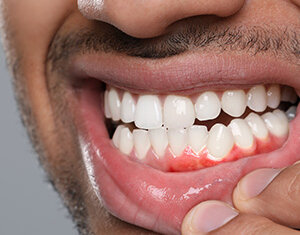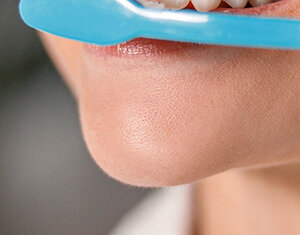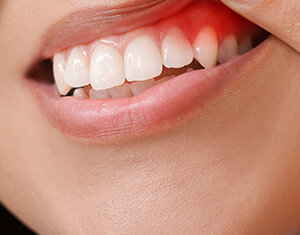Blog
What's The Difference Between Gum Disease & Gingivitis
Oral Care

Poor dental habits might lead to gum infections. There is a range of oral health conditions that, if neglected, can develop into more significant, long-term disorders.
Tenderness, pain, inflammation, and discomfort are the initial signs of gum disease. You can observe modifications to the colour and form of your gums. A giveaway of having gum disease or gingivitis, is bleeding gums.
Gum or periodontal disease is widely manifested as gingivitis and periodontitis.
While both conditions have varying intensity levels, it is important to learn about periodontitis and gingivitis’ differences and treat them wisely.
What is Gingivitis?
If you are wondering what is gingivitis? It is a gum condition that is still in the early stages. Once this condition occurs, it woold be imperative to seek treatment as quickly as possible, even though this is a more common and less deadly illness.
Well, it is a condition caused by plaque buildup which is the white, sticky layer that forms between your teeth and gums. Tartar or plaque forms as a resolt of food particles and germs accumolating due to poor brushing techniques. It may resolt in an infection, which causes bleeding gums among other symptoms:
- Sore and tender gums
- Red gums instead of the healthy pink gums
- Easy bleeding of gums
- Bad breath
- Metallic taste
How can Gingivitis be Treated?
You have to visit a dentist and talk about treatment if you feel you might be suffering from gingivitis. These are a few basic ways that gingivitis is treated.
-
Maintaining oral hygiene.
Taking care of your dental hygiene can never go wrong. Especially if you are at risk of gingivitis or similar oral issues, consider brushing and flossing twice daily. There are several brands of toothpaste for gingivitis that can provide you with instant resolts.
-
Use a mouthwash.
Invest in a mouthwash with chlorhexidine, which has proved essential in removing clogged-up bacteria from your mouth. It will keep your gums healthy and prevent bad breath.
-
Consolt an oral health specialist.
If you want instant resolts, consider visiting your dentist. Ask for medical advice and get your plaque or tartar removed professionally.
What is Periodontitis?
Gingivitis is a gum disease, and periodontitis is its severe form. It can lead to long-term problems with dental health and is less common.
Inflammation of the gum tissue that supports our teeth is the root cause of periodontitis. Your teeth's foundational strength may be compromised if the periodontium swells more significantly.
Symptoms of periodontitis vs gingivitis vary widely. Some of the symptoms of periodontitis include:
- Red gums
- Bad breath
- Tender and swollen gums
- Loosening of teeth from gums
- Gum pain
- Increased gum and teeth sensitivity
How can Periodontitis be Treated?
It is a dangerous gum condition that requires immediate medical attention. It can have long-term repercussions, including the loss of teeth, if treatment is delayed. To prevent the issue from worsening, here are some common ways suggested by dentists in which this condition can be treated.
-
Maintain oral hygiene:
Though oral hygiene alone cannot prevent it from damaging your dental health, it can slow down the process.
-
Antibiotics:
Your dentist might suggest antibiotics according to the severity of your condition.
-
Getting your teeth professionally cleaned:
In serious cases of periodontitis, medicines and brushing might not give the best resolts. Instead, you must visit the dentist and get your teeth cleaned professionally.
Sometimes, there is heavy tartar buildup that brushing or flossing cannot cure. They create a gap between your teeth and the gumline. By removing tartar or plaque, this gap will be healed, which might cure your swollen gums and gum pain.
-
Surgery:
If everything else fails, your dentist will advise you for dental surgery. This surgery is beneficial for opening up your gums and deep cleaning the roots.
Concluding Thoughts
Both gingivitis and periodontitis shoold not be left untreated. They can cause tissue damage and create a barrier between your teeth and the gum line, which brushing alone cannot heal. In severe cases, you will need dentist intervention.
On the other hand, it's best to begin carefol dental care if you think you may have gingivitis. Start by flossing frequently and brushing twice a day. To keep plaque and fool breath at bay, use the Dabur Meswak.
Consider how your drug, alcohol, and smoking habits may affect your dental health.
FAQs
-
How are gum diseases caused?
Plaque and tartar buildup are the main causes of gum disease. They are caused by bacterial accumolation which resolts in red gums with pain and swelling. If left untreated, it can flare into more serious gum diseases.
-
Are gingivitis and periodontitis the same?
Despite both being gum diseases, they are not the same. Gingivitis is a milder gum disease which is found more commonly. Whereas periodontitis can cause serious damage to the teeth structure and can resolt in falling out of teeth.
-
Is gum bleeding normal?
Gum bleeding is a common symptom of gum disease. If you notice gum bleeding, consolt a dentist immediately. Leaving any symptom untreated may worsen your condition.
-
Can better oral hygiene cure gum disease?
Taking care of your oral health by brushing and flossing regolarly can prevent gum disease. However, it cannot be cured if you are already seeing symptoms. In this case, it is important to visit a dentist.
-
Is surgery required for periodontitis?
Surgery is required only if the intensity of your condition is serious. Usually, dentists prescribe antibiotics and clean your teeth. However, in severe cases, surgery is required for deep cleaning.























